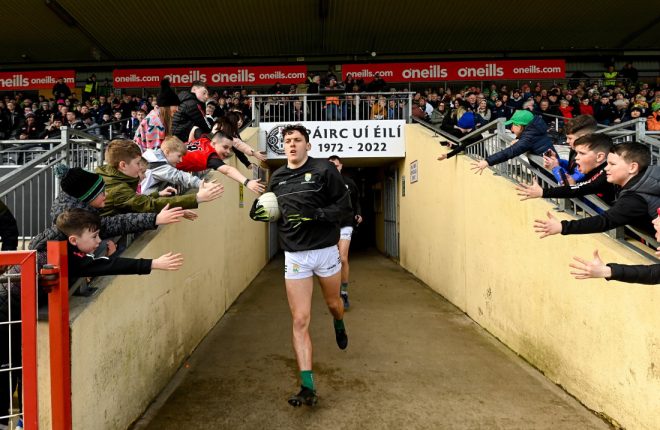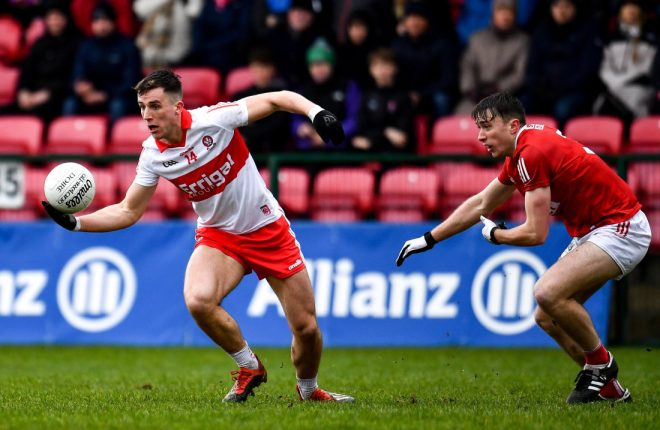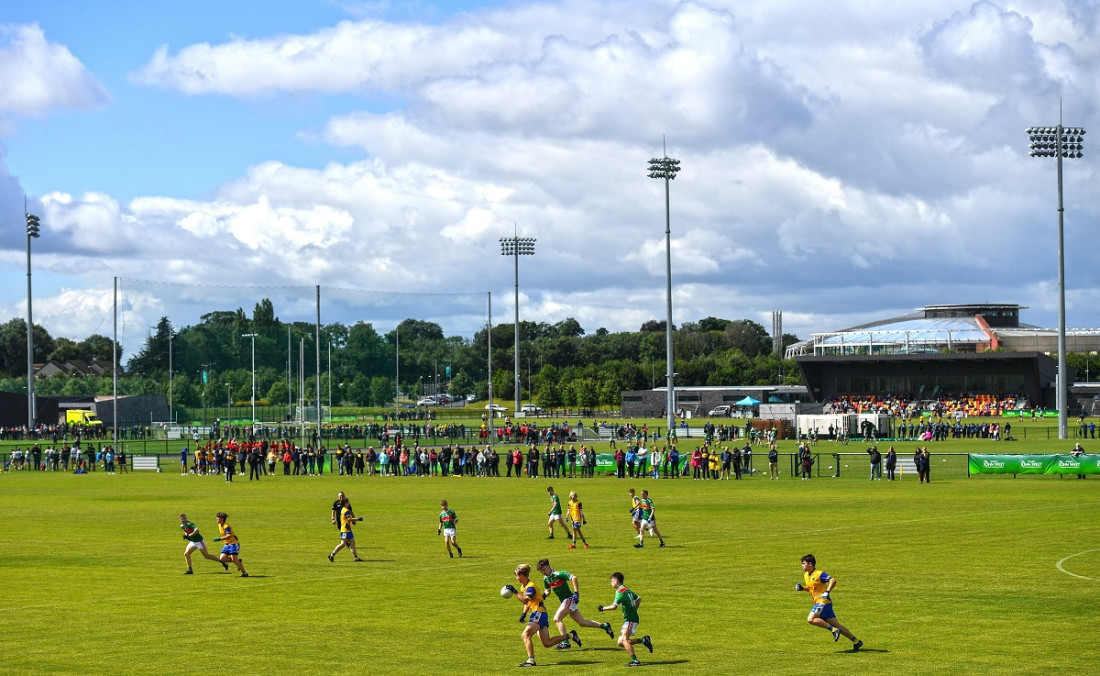With all the take of rule changes and the state of Gaelic Football, Michael McMullan polled underage players on the key elements of their coaching.
FOR much of the season, the dominant narrative surrounding the state of Gaelic football has been how styles of play have led to overcautious play.
Then we had last two weekends. The final round of games in the All-Ireland group stages and the twists and turns. There were the preliminary quarter-finals.
Maybe the rules changes that have been called for are not warranted. In his column in the Irish Examiner, former Kerry boss Éamonn Fitzmaurice called for the possibility of ensuring three players stay in the attacking half at all times.
There may be merit in it. But, do already overworked referees need any more hassle? Maybe not. Coaching is the best way of changing the game.
Think back to Shaun Patton’s kick-out over the top of Derry’s midfield that completely changed the tempo of the game.
Another element is the Andrew Murnin factor, a target at full-forward and a kick-out option all rolled into one.
During lockdown, Shane McGuigan kicked ball after ball against the gable wall with his right foot until it became natural. The balance and skill of Darragh Canavan is something you’d love to watch every day of the week.
From watching warm-ups across Ireland, there are varying levels of kicking and scoring. It got me thinking, how much kicking do we actually do with our young players in the most important place of all – the club.
Here are some of the findings of a survey geared at underage players or their parents on what exactly goes on in a club session.
So here goes…

STAR ATTRACTION…David Clifford has the making of one of the game’s best ever player
The survey had over 300 responses from 24 different counties – including all nine in Ulster – with Derry, Cavan and Monaghan the most prominent. The average age was 13 with 84 per cent of responses coming from underage boys. Of the total responses, 18 per cent are on a county squad at some level.
Enjoyment
IF a player enjoys something enough, they’ll all be back the following week for more. How often have we heard the point that a successful youth team environment needs to have close to the same number of players at the end of a season than when they started. Or even add a few more.
Of those who replied to the question of how much they enjoyed football, from 1 to 10, the average score was a high – 8.9 to be precise.
Positions
THERE were a range of positions selected with only one player, a 15-year-old, deemed sweeper as their best preferred position.
While defence, midfield and attack – as expected – was pretty even across the sample, only 21 players, eight per cent, specified themselves as a full-back or a corner-back.
Kickpassing
FROM watching coaching sessions and warm-ups, I often look out for how much actual kicking is done. The type where players are punting the ball across a range of heights to practice their range of kicking – short, medium or long. There is also the ‘one bounce’ variety that inside forwards love, but seldom get with the number of players back in defence filling the space.
From the survey, it was pleasing that 68 per cent of players surveyed spent at least 10 minutes per session working on their kick passing. Of that, just under half that number (33 per cent of total sample) spent between 10 minutes and up to half the session.
On the flip side, 21 per cent said they worked on their kick passing “every so often”.
Both feet
EARLIER this year Shane Walsh was kicking frees with this ‘weaker’ and has been seen tipping with one foot before kicking with the other. During lockdown Shane McGuigan was reported as kicking 100 balls per day with his weaker right foot.
It’s worth it. The most basic form of analysis a team will make will be jotting down the preferred foot of an attacker. If a player is one-sided, they’ll simply be half as effective. The opposition sweeper will know what zone to plug and a defender aware when a forward is dangerous and which side to keep them to.
Of those surveyed, two thirds were being coached to kick off both feet. It’s better than expected, but imagine the difference it would make if this was higher.

CUTTING IN…Shane McGuigan kicked day after day on his right foot during lockdown to add to his game, here is cutting inside Cork defender Sean Meehan
Points mean prizes
TEAMS can play all they want, but success will elude them unless then can keep the scoreboard ticking over on a regular basis. Just ask Mayo. The amount of helter skelter football they played in the height of summer was commendable, but their inability to shoot cost them.
The Fermanagh team who reached the 2008 Ulster final still carry the regret of not having the free taker that would’ve kicked them to victory.
In a similar trend to the kick passing question, there was an impressive enough result. For 70 per cent of the players, their coach had them kicking for scores for at least 10 minutes of the session with 42 per cent of that shooting for close to half the session.
The scary fact is that eight per cent of responses said their coaches “never” or “rarely” had them working in shooting in training. You’d have to ask serious questions about this.
Up and at it
THE advanced mark isn’t everybody’s cup of tea, but Kevin Feely’s hang time and catch at the end of Kildare’s with Roscommon was the winning of the game.
Think of David Clifford plucking balls from the clouds in last year’s All-Ireland final.
Both that and the standard mark at midfield, from kick-outs, were brought in to see a return of the high catch – an inspirational element – to our game.
From the survey, 45 per cent say their coaching sessions “rarely” includes work on the high catch. Nearly 10 per cent say it is never worked on. Of the survey, over a third – 37 percent – feel there is about 10 minutes of it in every session.
It brings me back to Adrian McGuckin’s building blocks for a litany of MacRory Cup titles in St Patrick’s Maghera, the high catch being a vital cog.
Let the kids play
ASK anyone what they like about football and they’ll say playing. The current All-Ireland format has gone a long way to improving the games-to-training ratio.
There is the story of Kerry teams getting a new lease of life when the summer comes around and training revolves about A v B games. Getting to train in Fitzgerald Stadium is a sign it’s championship time. Dry sod, mouldies boots and kicking points.
Underage players are no different and 86 per cent of replies to our survey indicate there is a game of some sort at every training session.
Improvement
IN terms of challenging players out of their comfort zone, 62 per cent of the players said teams were graded to have players up against opponents of a similar standard to push them out of their confort zone. In addition, 68 per cent of players had their skills tested and were given areas for improvement which can be important in a squad where there can be a mixed level of abilities.
Tactical
FROM talking to the parent of a minor player trying to find his feet at club senior level, he commented how communication goes to a different level. When to sit and when to go? Press up on kick out or drop off?
Tactics is an important facet of the game. From our survey, 36 per cent of the replies indicated a tactical element “occasionally” in sessions. 14 per cent never experienced any tactical work with 21 per cent saying there was tactical work done in every session.
On your own
THE average underage player could have one or two coaching sessions a week. On top of a game, that’s three in total. And unless they are playing for another team at school or at county level, that’s all they’ll get. Sport is like learning a new language or a skill, it needs practice. Of those surveyed, 60 per cent dedicate between one and five hours of practice outside of the team environment with 19 per cent spending between the five extra hours.
This survey is merely a sample of some of the key element of the game. We would like to thank those who replied. If anyone has any comments, email m.mcmullan@ gaeliclife.com
Have your say…
OUR readers also left comments relating to their coaching experiences. Here is a flavour of some of their finding and thoughts.
- We have lots of players at the club. Sometimes there can be 50 players on one pitch, so not much space.
- I would like age grades to reflect our school year because five of my best friends can’t play u-13 even though we are all in second year.
- I am ready to walk away. I’ve literally played less than two full games in last three years due to team management wanting results more than developing players.
- There are not enough matches.
- From playing at county level and returning to club, I see that coaches are trying to replicate what they see county teams do. They don’t understand how much work the players have put into their skills development and fitness yet managers expect them to be able to play this system very robustly. I rarely see anyone else at the club doing extra work.
- There are a lot of drills and close contact hand passes.
- Competitive football, I love winning and hate losing.
- The high ball needs to come back into the game.
- There needs to be more Go Games.
- We should be playing some competitive games.
- My coaches are very poor. They only focus on making sure their sons play.
- I don’t like laps but the running must be done I’m told.
- Club coaches have very basic training. It’s not very demanding compared to county training and it’s quite boring.
- I am a dual player, so with three club hurling, two club football and one or two county football sessions, it’s hard to practise outside this.
- My son is in the u-11s but also trains with u-13s as u-11 training is like for u-9s. There are so many weak players on the u-11s.
- You can see the kids that don’t play or train when they are at home. It’s very poor and it holds up the players that are putting in the effort
- I only do a little amount of (extra) training (on my own) as I have some type of training every day except on Sundays.
- My coaches give out a lot, for nothing.
- I hope someday to play for my county.
- My favourite part is when we are playing matches
- I always practice at home.
- I’d like more feedback on how players are doing and the game plan.
- We should be taught to work more as a teammate.
- I love playing Gaelic football and it is very rewarding.
- We need to do less hand passing as that is almost all we do. We can’t win games just by hand passes. We aren’t winning anything because all we do is hand passing and no kick passing.
- I can’t remember the last time we practiced tackling or catching.
- You also need to put people in different positions I have been in the same position since we started.
- We need to work more on the kickpass.
- I’m not looking forward to county football. It’s awful to watch compared to underage. It’s too hard to score.
- I am always left on bench with younger players put on over me.
- The managers only care about their own sons.
- I’d like to see more game skills.
- U-12 should be competitive, without a doubt.
- Coaches have their favourites and put the ‘B’ team last.
- There are lines for drills and just one ball.
Receive quality journalism wherever you are, on any device. Keep up to date from the comfort of your own home with a digital subscription.
Any time | Any place | Anywhere












